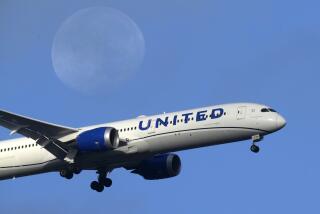Executive Travel : Frequent Fliers and the Problem of Expiration Dates
For many business travelers, it’s hard to keep at least some frequent-flier miles from expiring. Sometimes you just don’t feel like taking a trip--or you’re just too busy to pay attention to the mileage statements.
But there is at least one sign of softer expiration rules. Alaska Airlines recently became the first carrier to go back on its expiration policy, changing it so that miles no longer expire after three years.
Mileage on most carriers expires after that period, with the notable exceptions of Continental Airlines, USAir and Trans World Airlines--all carriers that have been troubled or faced severe competitive pressures in recent years. Delta Air Lines adds a wrinkle: You keep your miles as long as you fly Delta once every three years.
The other airlines argue that they could not keep a huge liability for free tickets on their books, and in fact there are fears that accounting rules might require them to value those miles as significant red ink on the corporate ledger.
Last year airlines wrote off about 60 billion miles during the year, including about 20 billion on Dec. 31, according to Randy Petersen, publisher of InsideFlyer, a Colorado-based publication that tracks frequent-flier miles.
Alaska Airlines may be seeking a competitive advantage, but it says it made its recent move for customers. Also, Alaska can more easily afford to let miles accumulate without expiration because its liability for providing free tickets is not as great as carriers that fly cross-country, Petersen said.
The best part of Alaska’s change may be for travelers who make heavy use of its partners around the country and the world. Miles earned on Alaska’s partners--including Horizon Air, SAS, TWA, Northwest Airlines, British Airways and Qantas Airways--and credited to an Alaska account will also no longer be subject to a three-year expiration, said Lou Cancelmi, spokesman for Alaska.
Petersen doesn’t think other carriers will change their policies in response to Alaska’s move. Consumers have gotten used to the idea that their miles will expire, he said. “It’s become quite accepted out there.”
And the larger carriers have concluded that if they allowed miles to stay indefinitely, eventually they wouldn’t be able to offer enough seats to accommodate travelers who wanted to redeem their awards to those cities.
“Consumers obviously would prefer they never expire,” said Mike Mitchell, manager of corporate communications for America West Airlines. “But most people believe three years is a reasonable period of time.”
*
Airline expiration policies differ.
America West, for example, automatically issues mileage certificates once an account reaches 20,000 miles. Those mileage certificates expire three years from the date of issue, Mitchell said. The mileage is not subject to expiration while it is accruing in the account, however.
American Airlines, United Airlines and Northwest Airlines, on the other hand, bank miles for three years at a time by calendar year. Any miles earned in 1993, for example, will expire at the end of 1996, regardless of whether they were earned at the beginning or the end of 1993.
If no combination of miles is enough to get you a free ticket award, you can still get some benefit from your expiring miles by donating them to charity, according to Tom Parsons, publisher of Best Fares Discount Travel Magazine. American, for example, has a Miles for Kids program that uses donated miles for charities. United also allows you to sign miles over to a charity of your choice.
More to Read
Sign up for The Wild
We’ll help you find the best places to hike, bike and run, as well as the perfect silent spots for meditation and yoga.
You may occasionally receive promotional content from the Los Angeles Times.






